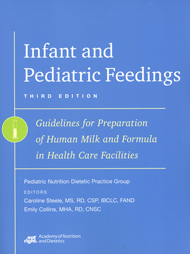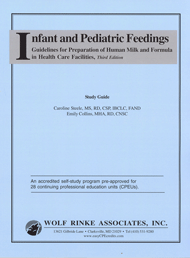|
Infant and Pediatric Feedings:
Guidelines for Preparation of Human Milk and Formula in Health Care Facilities
Third Edition
Provides comprehensive up-to-date information on human milk and formula storage, handling, and preparation techniques based on the latest scientific research, public policy, and expert consensus. More specifically you will discover:
- guidelines for implementing centralized infant and pediatric feeding preparations,
- information on donor human milk along with guidelines for human milk products,
- the latest on lactoengineering techniques,
- about the use of blenderized tube feedings within the hospital setting, and
- expanded information on modular components and other additives.
Share with a friend and Save! Click here for important information about
sharing.
To order an ADDITIONAL Reporting Form click below:
C329F |
28 CPEUs |
REPORTING FORM |
|
|
Infant and Pediatric Feedings:
Guidelines for Preparation of Human Milk and Formula in Health Care Facilities
Third Edition
© 2024 Wolf Rinke Associates. All rights reserved for this self-directed accredited learning activity. Reproduction in whole or part without written permission, except for brief excerpts, is prohibited.
LEARNING OBJECTIVES
Upon completion of this CPE activity you will be better able to:
- Evaluate current human milk and formula handling procedures within your organization to ensure that processes are in alignment with best practices.
- Advocate for necessary changes for best practices regarding human milk and formula handling within your organization.
- Create an operational plan for initiating or expanding infant/pediatric feeding preparation operations.
- Develop policies and procedures that outline specific processes for infant/pediatric feeding handling including staffing, sanitation, refrigeration, storage, preparation, and distribution.
- Generate an implementation plan including key stakeholder communication and education.
- Implement best practices in the handling of infant and pediatric enteral feedings.
- Perform ongoing quality monitoring of handling procedures, with adjustment of processes as indicated, using quality improvement tools such as Hazard Analysis Critical Control Point (HACCP) or Plan-Do-Check-Act (PDCA) cycles.
Return to the top of page
If you prefer to order by phone, mail
or fax click below
or click here to contact us with
other questions.
For information about our other products and
services return to the sidebar at the top of the page.
|
|
|



